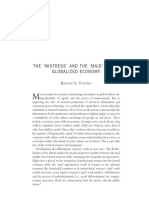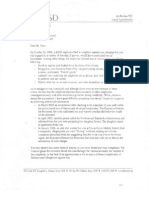American History Notes Discovery and Colonization History Notes
American History Notes Discovery and Colonization History Notes
Uploaded by
docuworksCopyright:
Available Formats
American History Notes Discovery and Colonization History Notes
American History Notes Discovery and Colonization History Notes
Uploaded by
docuworksOriginal Title
Copyright
Available Formats
Share this document
Did you find this document useful?
Is this content inappropriate?
Copyright:
Available Formats
American History Notes Discovery and Colonization History Notes
American History Notes Discovery and Colonization History Notes
Uploaded by
docuworksCopyright:
Available Formats
American History Notes Discovery and Colonization 1.
Native Americans : crossed Bering Strait land bridge and developed diverse cultures across North and South America -Southeastern North America a. Cultural Regions -Maya -Aztecs -Inca -Northwestern North America -Southwestern North America -Central Plains -Central River Valleys -Northeastern North America b. Cultural Differences -matrilineal decent -division of labor: women performed domestic duty, child care, ag. men performed hunting, trading, war -religion: polytheistic nature rituals -honor came before wealth -property was communal
2. European Exploration and Colonization
a. Motivations: Renaissance, Absolute Monarchy, Protestant Reformation, Technological Changes, Wealth and Power
b. Portugal: Prince Henry the Navigator encouraged and financed exploration
-Bartholomeau Dias: 1 st explorer to reach Cape of Good Hope -Vasco da Gama: 1 st to reach India and establish profitable trade
c. Spain: torn by the Reconquest but recently united by the marriage of Ferdinand and Isabel needed to catch up with Portugal
-Columbus: discovery led to European dominance over N & S America-1492 -Amerigo Vespucci: concluded that N & S America were continents -Ponce de Leon: discovered Florida-1513 -Vasco Nunez de Balboa: discovered Pacific Ocean-1513 -Ferdinand Magellan: circumnavigation proved the New World-1519 -Hernan Cortes: conquered Aztecs in 1519 -Francisco Pizarro: conquered Incas in 1522 -Hernando De Soto: discovered Mississippi River in 1541 -Francisco Coronado: discovered Grand Canyon
-Significance: Spanish explorers claimed everything from California to Florida, Southwestern US, Mexico, Central and South America; Spain grew rich from gold/silver
d. France: Hundred Years War delayed French Exploration, but winning allowed Fr. to begin before England
-Jacques Cartier: claimed Canada for France-1535 -Samuel de Champlain: established Quebec-Marquette & Joliet: Mississippi R. south from Canada to Arkansas R. -La Salle: discovered mouth of Mississippi R. giving FR. claim to Louisiana
-Significance: France claimed Louisiana (Appalachians to Rockies) and Canada, grew rich from fur trading
e. England: delayed exploration due to Hundred Years War/War of the Roses so the only land was east of the Appalachians
-Henry Hudson: claimed New York for Dutch, England seized it later
-John Cabot: claimed East Coast from Vermont to Georgia for England
3. The 13 English Colonies a. New England Colonies Massachussetts: Separatists founded Plymouth(1620); Mayflower Compact Puritans (1639) established Massachusetts Bay Colony committed to strict Calvinism led by John Winthrop Rhode Island: founded by Roger Williams/Anne Hutchinson after they were exiled from Mass. for religious beliefs-1644 Connecticut: founded by Puritans leaving Mass. led by Thomas Hooker New Hampshire: founded by Puritans leaving Mass.
b. Middle Colonies New York: Dutch established in 1626; England took it New Jersey: 1681 Pennsylvania: land granted to William Penn (1682) to open settlement for England's persecuted Quakers Quakers believed in equality, pacifism and NO SLAVERY Delaware: land bought by Penn to give Pennsylvania access to Atlantic ports
c. The Southern Colonies
Virginia: the 1st and most important colony -Roanoke attempted by Sir Walter Raleigh in 1587; John White returned to England for supplies, but was delayed by the Spanish Armada -Jamestown (1607) established by a joint-stock co.; John Smith saved Jamestown from starvation with the help of Pocahontas/Powhatan; -John Rolfe made tobacco a cash crop that finally made English colonies valuable
-House of Burgesses: elected landowners that counseled royal governor
Maryland: Lord Baltimore-George Calvert, given land to open settlement for England's persecuted Catholics; established religious freedom North Carolina: 1663-tobacco plantations; relied on slave labor South Carolina: 1663-tobacco/rice plantations; relied on slave labor Georgia: 1732 land granted James Oglethorpe to settle English debt prisoners between English Colonies and Spanish Florida; peaches profited 4. The French and Indian War (7 Years War) a. English and French colonists pushing into Ohio River Valley for land/furs caused a colonial conflict that developed into the first real world war with France and Spain fighting against England b. Early battles favored the French -George Washington's Virginia militia defeated at Ft. Duquesne -Gen. William Braddock's regulars surrounded and destroyed at Duquesne -French used Indian allies and guerilla tactics to slaughter English colonists c. William Pitt: newly elected PM reorganized army, raised taxes, took loans -Generals James Wolfe and Jeffrey Amherst took over English armies -Ft. Duquesne captured -Battle of Quebec: Wolfe defeats Montcalm to capture Quebec -Iroquois League join England, while Fr. lost Indian allies -Battle of Montreal: French surrender Sept. 8, 1760 d. Treaty of Paris-1763 -England gains Canada and all lands east of Mississippi from France -England gains Florida from Spain -Spain gets Louisiana (Mississippi River to Rocky Mountains) e. Significance: -England gains a world wide empire and proves their navy is supreme -England concludes that high taxes and loans to defend the colonies were unfair to citizens living in England that already carried a higher tax burden than colonists. * England begins raising taxes on colonies*
5. The Road to Revolution a. Proclamation Act of 1763: England forbids settlement West of Appalachians in order get better control of colonists, but colonists are angered because it limited economic opportunity and defeated purpose of French and Indian War b. Quartering Acts: required colonies to house and supply English troops in return for the troops defending the colonists c. Cherokee War: Cherokee forced to leave Carolinas and Virginia-1761 d. Pontiac's Rebellion: fear of English expansion and corrupt trading after the French and Indian War prompted an alliance of 8 tribes to wage a 3 year war e. Sugar Act, Stamp Act, Declaratory Act, Townshend Acts, Tea Act and Intolerable Acts passed by Parliament to pay for French/Indian War, colonial defense and administration; and to regain control over the insubordinate colonists
You might also like
- AP U.S. History Overall Brinkley Textbook OutlineDocument24 pagesAP U.S. History Overall Brinkley Textbook OutlineMatthew FerreeNo ratings yet
- Fur Trade NotesDocument3 pagesFur Trade Notesapi-307852771No ratings yet
- Afi 36-2903, 18 July 2011Document179 pagesAfi 36-2903, 18 July 2011solsysNo ratings yet
- ARPI Standard Club Bylaws & ConstitutionDocument3 pagesARPI Standard Club Bylaws & ConstitutionHome Home100% (1)
- The Punjab Urban Immovable Property Tax ActDocument12 pagesThe Punjab Urban Immovable Property Tax ActHumayoun Ahmad FarooqiNo ratings yet
- APUSH Notes Chapter 2 ScribdDocument14 pagesAPUSH Notes Chapter 2 ScribdMathian ValiNo ratings yet
- Ir BritainDocument10 pagesIr Britainapi-224598013No ratings yet
- European Exploration and Colonization PDFDocument2 pagesEuropean Exploration and Colonization PDFDelreeceNo ratings yet
- LoyalistsDocument19 pagesLoyalistsapi-330224121100% (1)
- Causes Industrial RevolutionDocument4 pagesCauses Industrial Revolutionapi-286657372No ratings yet
- Congress of Vienna WorksheetDocument5 pagesCongress of Vienna WorksheetDiego A. RamírezNo ratings yet
- chc2d - History Skills DiagnosticDocument8 pageschc2d - History Skills Diagnosticapi-263638343No ratings yet
- Social Studies Final Exam Review Key 2015Document33 pagesSocial Studies Final Exam Review Key 2015api-193600542No ratings yet
- Imperialism, World War, and RevolutionDocument34 pagesImperialism, World War, and Revolutionapi-286746886No ratings yet
- Chapter 6 Study GuideDocument3 pagesChapter 6 Study GuideScarlette MckayNo ratings yet
- War of 1812 ActivityDocument3 pagesWar of 1812 Activityapi-330224121No ratings yet
- 4.1 The Stirrings of RebellionDocument7 pages4.1 The Stirrings of RebellionPatrick ThorntonNo ratings yet
- Leading Figures of The Renaissance TextDocument22 pagesLeading Figures of The Renaissance Textapi-233464494No ratings yet
- American West Flashcards PDFDocument6 pagesAmerican West Flashcards PDFWill TeeceNo ratings yet
- Colonization Unit Test Jeopardy ReviewDocument53 pagesColonization Unit Test Jeopardy ReviewBillyNo ratings yet
- Apush Chapter 16-17 Study GuideDocument8 pagesApush Chapter 16-17 Study Guideapi-236296135No ratings yet
- Children in Victorian LondonDocument7 pagesChildren in Victorian Londonswanil_choksi100% (1)
- World History Important DateDocument3 pagesWorld History Important DateHabib ManzerNo ratings yet
- Nationalism and Imperialism Graphic OrganizerDocument11 pagesNationalism and Imperialism Graphic Organizerapi-283978261No ratings yet
- American RevolutionDocument34 pagesAmerican RevolutionChris KellerNo ratings yet
- Absolutism and Constitutional IsmDocument24 pagesAbsolutism and Constitutional IsmTin LuuNo ratings yet
- Chapter 17 Reading GuideDocument4 pagesChapter 17 Reading GuideJason NeifferNo ratings yet
- AP Euro Study Guide Chapter 12Document4 pagesAP Euro Study Guide Chapter 123l39h4ntNo ratings yet
- AP Euro Chapter 15Document8 pagesAP Euro Chapter 15Giulia ConleyNo ratings yet
- CHAPTER 26 - World War IIDocument22 pagesCHAPTER 26 - World War IIJonathan Daniel KeckNo ratings yet
- Nationalism and German UnificationDocument4 pagesNationalism and German UnificationkrizalynNo ratings yet
- Chronological Timeline of Key Canadian Historical EventsDocument5 pagesChronological Timeline of Key Canadian Historical EventsJessie SunNo ratings yet
- Notes - Battles of The American Revolutionary War - Rank em - ws-1Document2 pagesNotes - Battles of The American Revolutionary War - Rank em - ws-1api-236682830No ratings yet
- A Brief History of The UsaDocument20 pagesA Brief History of The UsaElbert JolioNo ratings yet
- World War II: Outcome: The European TheaterDocument29 pagesWorld War II: Outcome: The European TheaterJennifer HoangNo ratings yet
- Chapter 13 OutlineDocument6 pagesChapter 13 OutlineAndrew Treulich100% (1)
- The Colonization of AmericaDocument6 pagesThe Colonization of AmericaLoretta Lynn AltmayerNo ratings yet
- Notes: The French Revolution and Napoleon: Spielvogel Chapter 19Document5 pagesNotes: The French Revolution and Napoleon: Spielvogel Chapter 19Klem NderituNo ratings yet
- The Treaties of WwiDocument10 pagesThe Treaties of WwiMagnolia SongNo ratings yet
- 3 9outlineDocument2 pages3 9outlinealanamadzNo ratings yet
- America's History Chapter 8: Westward Expansion and A New Political Economy, 1790-1820Document15 pagesAmerica's History Chapter 8: Westward Expansion and A New Political Economy, 1790-1820irregularflowersNo ratings yet
- The Changing Nature of Warfare in The 20 Century: - Revision NotesDocument32 pagesThe Changing Nature of Warfare in The 20 Century: - Revision NotesRishab SharmaNo ratings yet
- The 19th Century Novel-3Document13 pagesThe 19th Century Novel-3yasmine riahiNo ratings yet
- AP Euro Study GuideDocument37 pagesAP Euro Study GuideFrancesca ElizabethNo ratings yet
- Chaucer To ShakespeareDocument17 pagesChaucer To ShakespeareAbinaya RNo ratings yet
- Antebellum SouthDocument46 pagesAntebellum SouthCarleighNo ratings yet
- Russian Revolution: IB History Ms. PerezDocument23 pagesRussian Revolution: IB History Ms. PerezSol Ines PerezNo ratings yet
- The American Pageant 13th Edition-Ch. 5 OutlineDocument14 pagesThe American Pageant 13th Edition-Ch. 5 OutlinegjurlandoNo ratings yet
- Ap Euro Chapter 12Document11 pagesAp Euro Chapter 12MelindaNo ratings yet
- The American Revolution: Mr. MccaskillDocument16 pagesThe American Revolution: Mr. MccaskillT. McCaskill100% (1)
- StudentnotesDocument5 pagesStudentnotesapi-264685275No ratings yet
- Absolutism Ends in England Reading AnswersDocument5 pagesAbsolutism Ends in England Reading AnswersAlexie Fonseca-Rodriguez - StudentNo ratings yet
- Grade 11 Canadian History Exam ReviewDocument7 pagesGrade 11 Canadian History Exam Reviewapi-223081096No ratings yet
- Chapter 19 & 20 Notes Industrial RevolutionDocument40 pagesChapter 19 & 20 Notes Industrial RevolutionDavid DuezNo ratings yet
- Colonization of America in DetailDocument14 pagesColonization of America in DetailPravinNo ratings yet
- Chapter Two: When Worlds Collide, 1492-1590Document31 pagesChapter Two: When Worlds Collide, 1492-1590api-171412573100% (1)
- APUSH Study GuideDocument60 pagesAPUSH Study GuideDeepti SailappanNo ratings yet
- APUSH Chapter 5 NotesDocument4 pagesAPUSH Chapter 5 Notesphthysyllysm50% (2)
- American Colonies: Colony Founded Region Founder Religion Government Original Purpose Economics NoteDocument2 pagesAmerican Colonies: Colony Founded Region Founder Religion Government Original Purpose Economics NotetheconformistNo ratings yet
- CHAPTER 18 - The French Revolution and NapoleonDocument22 pagesCHAPTER 18 - The French Revolution and NapoleonJonathan Daniel KeckNo ratings yet
- Jamestown: The Novel: The story of America's beginningsFrom EverandJamestown: The Novel: The story of America's beginningsNo ratings yet
- Frank-Magyarics WHD SummaryDocument10 pagesFrank-Magyarics WHD SummaryJohnNo ratings yet
- Grade 10 Full-1Document73 pagesGrade 10 Full-1yjaya6912No ratings yet
- Format of Student Anti Ragging AffidavitDocument2 pagesFormat of Student Anti Ragging Affidavitsinghdevpratap940No ratings yet
- The American West-Clemen D B GinaDocument13 pagesThe American West-Clemen D B GinaSuŁFurツNo ratings yet
- Social Dimensions in EducationDocument23 pagesSocial Dimensions in EducationRyan Cornista100% (1)
- Separation of Powers and The Judicial BranchDocument17 pagesSeparation of Powers and The Judicial BranchHarvin KaurNo ratings yet
- Ethics in Human Resources: Presented By:Swatinigam Jagraninstitute of ManagementDocument17 pagesEthics in Human Resources: Presented By:Swatinigam Jagraninstitute of ManagementMateo CarinoNo ratings yet
- Group Assignment-Syndicate 3Document2 pagesGroup Assignment-Syndicate 3Handi Aulia NurrahmanNo ratings yet
- ThrissurDocument2 pagesThrissurVidya AdsuleNo ratings yet
- 2023 - 004 CONG. DUKE FRASCO 5M - Liang Covered CourtDocument1 page2023 - 004 CONG. DUKE FRASCO 5M - Liang Covered CourtbarangaybingayNo ratings yet
- Rankin SB 1112012 Minutes Final-2Document130 pagesRankin SB 1112012 Minutes Final-2the kingfishNo ratings yet
- Hui o Nā Wai 'Ehā Official Statement Re CCH Final D&O 6-29-2021Document1 pageHui o Nā Wai 'Ehā Official Statement Re CCH Final D&O 6-29-2021HNNNo ratings yet
- The Enlightenment in Europe IIDocument7 pagesThe Enlightenment in Europe IIEmre TeğinNo ratings yet
- HB3399 NCLB Waiver FlowchartDocument2 pagesHB3399 NCLB Waiver FlowchartJason NelsonNo ratings yet
- The Michigan Banner August 1, 2014 EditionDocument36 pagesThe Michigan Banner August 1, 2014 EditiontangramtechNo ratings yet
- Andaya Vs RTC CebuDocument1 pageAndaya Vs RTC CebuHarold EstacioNo ratings yet
- Bibliografia Carl SchnitttDocument7 pagesBibliografia Carl SchnitttLeonardo ZúñigaNo ratings yet
- City of Lapu-Lapu vs. PezaDocument29 pagesCity of Lapu-Lapu vs. PezaKobe BullmastiffNo ratings yet
- CWGDocument28 pagesCWGAkhil GaurNo ratings yet
- Carpio V Executive Sec Case DigestDocument5 pagesCarpio V Executive Sec Case DigestPouǝllǝ ɐlʎssɐNo ratings yet
- Revised AIP Form - Excel TemplateDocument6 pagesRevised AIP Form - Excel Templatemichele de veraNo ratings yet
- The Future of Multi-Cultural SocietiesDocument9 pagesThe Future of Multi-Cultural SocietiesYOLANIS ESCUDERONo ratings yet
- Red Cross Volunteer Application 2006Document3 pagesRed Cross Volunteer Application 2006Stephanie AnneNo ratings yet
- Owasso Independent School Dist. No. I-011 v. Falvo, 534 U.S. 426 (2002)Document9 pagesOwasso Independent School Dist. No. I-011 v. Falvo, 534 U.S. 426 (2002)Scribd Government DocsNo ratings yet
- Brigitte Young - The Mistress and The Maid in The Globalized Economy (2001) PDFDocument13 pagesBrigitte Young - The Mistress and The Maid in The Globalized Economy (2001) PDFEliza CabreraNo ratings yet
- Supt Hawkins To Ron Gray - Sexual Harassment Misconduct 11-20-06Document2 pagesSupt Hawkins To Ron Gray - Sexual Harassment Misconduct 11-20-06Killi LeaksNo ratings yet
- 3rd Summative Test English 5 2nd GradingDocument2 pages3rd Summative Test English 5 2nd GradingPey PolonNo ratings yet

























































































